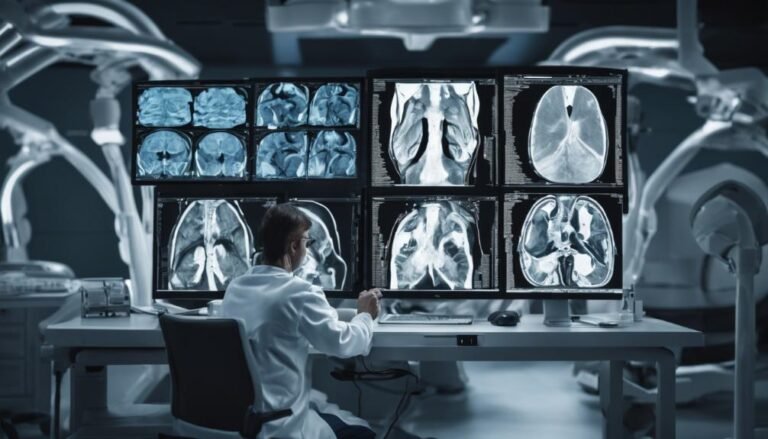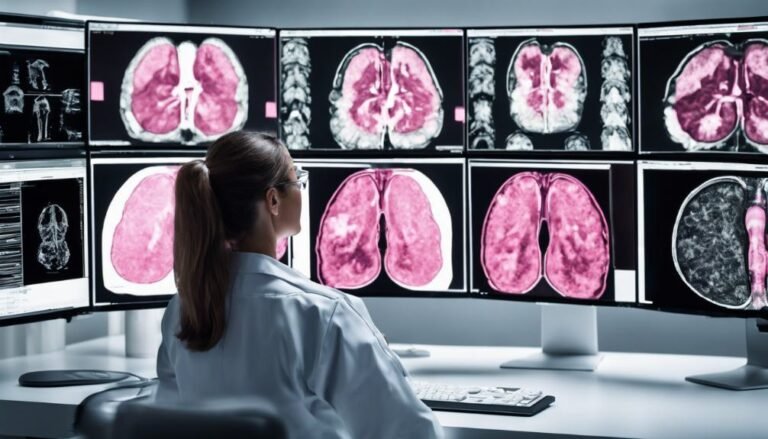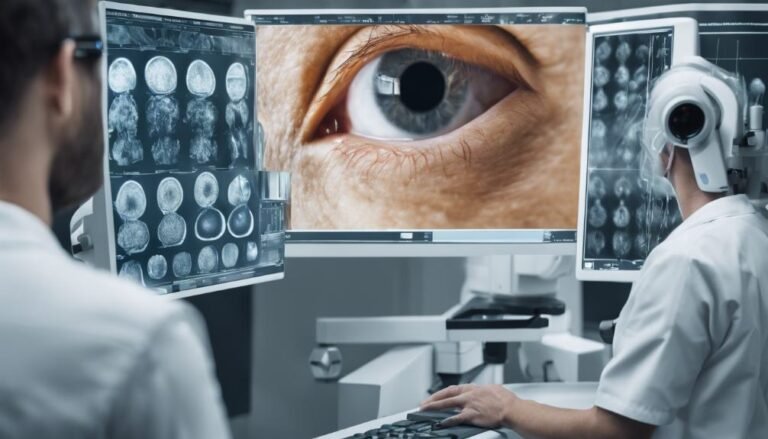AI in Patient Care: A Guide
In the domain of patient care, AI stands as a silent yet powerful ally, reshaping the landscape of healthcare delivery. From optimizing treatment plans to enhancing diagnostic accuracy, AI's impact is undeniable. But have you ever pondered the intricate ethical considerations and challenges that accompany this transformation? As you navigate through the complexities of AI integration in patient care, a deeper understanding of its nuances and future implications awaits your exploration.
Key Takeaways
- AI in patient care enhances diagnostic accuracy.
- Personalized treatment plans are developed using AI.
- AI enables remote patient monitoring for proactive care.
- Telemedicine services are optimized with AI technology.
- AI algorithms in medical imaging improve patient outcomes.
The Role of AI in Healthcare
In modern healthcare, AI is increasingly playing a pivotal role in revolutionizing patient care through data-driven insights and predictive analytics. By harnessing the power of artificial intelligence in healthcare settings, patient outcomes are being greatly improved. AI algorithms can analyze vast amounts of patient data to identify patterns and trends that human healthcare providers might overlook. This leads to earlier detection of potential health issues, personalized treatment plans, and overall better management of patient care.
AI in healthcare isn't meant to replace human healthcare providers but to complement their skills and expertise. By incorporating AI tools into daily practice, healthcare professionals can make more informed decisions, leading to more accurate diagnoses and effective treatment strategies. The integration of AI also helps streamline administrative tasks, allowing healthcare providers to spend more time focusing on direct patient care.
Diagnostic Applications of AI
Utilizing advanced AI algorithms, healthcare providers can leverage diagnostic applications to enhance the accuracy and efficiency of patient assessments. AI plays a vital role in early detection by analyzing vast amounts of patient data to identify patterns and trends that may indicate potential health issues. By integrating AI into diagnostic processes, healthcare professionals can detect diseases at their inception stages, allowing for timely interventions and improved outcomes. This proactive approach aligns with the principles of preventive care, focusing on identifying risks and intervening before conditions escalate.
AI-driven diagnostics not only assist in identifying illnesses but also contribute to personalized treatment plans by providing tailored recommendations based on individual patient data. Through AI-powered diagnostic tools, healthcare providers can streamline diagnostic procedures, reduce diagnostic errors, and optimize resource allocation.
Personalized Treatment Plans
By tailoring treatment plans specifically to individual patient data, healthcare providers can greatly improve outcomes and enhance the overall quality of care. This approach, known as personalized treatment plans, focuses on delivering individualized care through tailored interventions. Through the use of AI, patient data such as genetic information, medical history, and lifestyle factors can be analyzed to create customized treatment strategies that address the unique needs of each patient.
Personalized treatment plans offer numerous benefits, including increased treatment effectiveness, reduced adverse effects, and improved patient satisfaction. By taking into account a patient's specific characteristics and circumstances, healthcare providers can optimize treatment outcomes and minimize the risk of complications. Tailored interventions can also help in identifying the most suitable medications, dosages, and therapies for each individual, leading to more targeted and efficient care.
Incorporating AI into the development of personalized treatment plans enables healthcare providers to harness the power of data analytics and predictive modeling, ultimately revolutionizing the way patient care is delivered. By embracing individualized care, providers can enhance treatment precision and tailor interventions that cater to the unique needs of each patient.
Streamlining Patient Monitoring
To enhance patient care further, consider optimizing the process of monitoring patients by implementing streamlined approaches that leverage AI technology.
Remote monitoring, coupled with data analytics, offers a holistic solution to track patient health in real-time, leading to timely interventions and improved outcomes.
Remote monitoring through wearable devices or sensors allows healthcare providers to continuously collect important signs and other relevant health data without the need for constant in-person visits. These devices transmit the information securely to healthcare professionals, enabling proactive adjustments to treatment plans based on real-time insights.
By integrating data analytics into remote monitoring systems, AI can identify patterns and trends in the patient's health data that may not be immediately apparent to human observers. This analytical power enhances early detection of potential health issues, enabling healthcare providers to intervene promptly and prevent complications.
Incorporating AI-driven remote monitoring with data analytics not only streamlines the patient monitoring process but also empowers healthcare teams to deliver more personalized and effective care, ultimately leading to better patient outcomes.
Enhancing Telemedicine Services
Enhance the delivery of healthcare services by leveraging telemedicine to provide efficient and convenient care to patients remotely. Remote consultations have become increasingly popular, allowing individuals to access medical advice without the need for in-person visits. Through the integration of AI algorithms, telemedicine platforms can offer thorough care recommendations based on individual health data and symptoms, enhancing the quality of virtual check-ups.
Virtual check-ups conducted via telehealth solutions enable healthcare providers to monitor patients' health status continuously, leading to early detection of potential issues and timely interventions. These platforms can track essential signs, medication adherence, and lifestyle habits, providing a detailed overview of a patient's well-being.
AI in Medical Imaging
You'll be intrigued to learn about the cutting-edge advancements in image analysis through AI that are revolutionizing medical imaging.
AI algorithms are enhancing diagnostic accuracy, leading to earlier detection of conditions and more personalized treatment plans.
These developments are greatly improving patient outcomes and streamlining healthcare processes.
Image Analysis Advancements
In addition to the integration of artificial intelligence technology, significant advancements have been made in the field of medical imaging, particularly in image analysis processes. Deep learning algorithms, a subset of AI, have revolutionized the way medical images are interpreted. Through computer vision, AI systems can now analyze complex images such as MRIs, CT scans, and X-rays with incredible accuracy and speed.
These advancements in image analysis have led to more efficient diagnoses and treatment plans for patients. AI can assist radiologists in detecting subtle abnormalities that might be missed by the human eye, ultimately improving patient outcomes. Additionally, by automating repetitive tasks like image segmentation and feature extraction, AI allows healthcare professionals to focus more on patient care and less on manual labor.
Incorporating AI in image analysis not only enhances the speed and accuracy of diagnostics but also opens doors for personalized medicine and tailored treatment strategies. As technology continues to advance, the synergy between deep learning and medical imaging holds immense promise for the future of patient care.
Diagnostic Accuracy Improvement
The integration of artificial intelligence technology in medical imaging has greatly enhanced the diagnostic accuracy of interpreting complex images such as MRIs, CT scans, and X-rays. Through advanced data interpretation and machine learning algorithms, AI has revolutionized the field of radiology. By analyzing vast amounts of imaging data, AI systems can detect subtle patterns and anomalies that may not be immediately apparent to the human eye, leading to earlier and more accurate diagnoses.
Algorithm optimization plays an important role in improving healthcare outcomes by reducing errors and providing more precise interpretations. AI algorithms can learn from large datasets, continuously improving their accuracy and efficiency over time. This continuous learning process enhances diagnostic capabilities, ultimately benefiting patients by enabling timely interventions and personalized treatment plans.
The synergy between AI technology and medical imaging not only enhances diagnostic accuracy but also streamlines workflows, leading to more efficient healthcare delivery. As AI continues to evolve, its role in medical imaging will likely expand, further advancing diagnostic capabilities and improving patient outcomes.
Ethical Considerations in AI
As you start delving into the ethical considerations in AI within patient care, you'll encounter essential points to ponder.
Privacy in AI ethics is vital to safeguard patient information and maintain trust in healthcare systems.
Addressing bias and ensuring fairness in AI algorithms are imperative to prevent disparities in patient outcomes, while transparency requirements help build accountability and understanding in the use of these technologies.
Privacy in AI Ethics
Ensuring privacy in AI ethics is an essential component of maintaining trust and safeguarding patient data integrity in healthcare settings. Data security is paramount when implementing AI in patient care. It's important to guarantee that patient information remains confidential and protected from unauthorized access. To achieve this, healthcare providers must implement robust security measures to safeguard sensitive data processed by AI systems.
Informed consent also plays a significant role in maintaining privacy in AI ethics. Patients have the right to understand how their data will be used in AI applications and must provide consent for its utilization. Transparent communication regarding data collection, storage, and utilization is crucial to build trust between patients, healthcare providers, and AI systems.
Bias and Fairness
To uphold ethical standards in AI applications for patient care, addressing bias and ensuring fairness are fundamental considerations. Ethical implications arise when biases in AI algorithms lead to unequal treatment or inaccurate predictions for certain patient groups. Ensuring fairness involves actively identifying and mitigating biases present in the datasets used to train AI models. Data accuracy is paramount in reducing the potential for biased outcomes, as inaccuracies can perpetuate unfair treatment or misdiagnoses.
Studies have shown that AI systems trained on biased data can perpetuate and even exacerbate existing healthcare disparities. Recognizing these challenges, researchers and developers are working to implement strategies like diverse dataset curation, bias detection algorithms, and fairness metrics to promote equitable AI in patient care. By continuously evaluating and refining AI algorithms for bias and fairness, healthcare providers can aim to deliver more accurate, inclusive, and ethical care to all patients.
Addressing bias and ensuring fairness in AI applications is essential for maintaining trust, promoting patient safety, and advancing equitable healthcare practices.
Transparency Requirements
Maintaining transparency in AI applications for patient care is essential for upholding ethical standards and building trust with patients and healthcare providers alike. Trustworthiness requirements dictate that AI systems used in patient care must operate in a transparent manner, allowing for the explanation of decisions made by the algorithm. This transparency not only guarantees accountability but also enables healthcare professionals to understand and validate the AI's recommendations, ultimately improving patient outcomes.
To meet transparency requirements, healthcare organizations should implement accountability measures such as regular audits, documentation of AI algorithms and data sources, and clear communication of how AI is utilized in patient care.
Overcoming Implementation Challenges
Addressing the challenges of implementing AI in patient care requires careful planning and collaboration among healthcare professionals, technology experts, and administrators. To overcome these hurdles, it's important to develop robust implementation strategies that focus on seamless technology integration within existing healthcare systems.
One key challenge is ensuring that AI algorithms are effectively integrated into clinical workflows without disrupting the delivery of care. This necessitates close coordination between clinicians and technical teams to align AI tools with the specific needs of healthcare settings.
Additionally, providing thorough training to healthcare staff on how to use AI tools effectively is essential for successful implementation.
Moreover, data privacy and security concerns must be addressed to maintain patient trust and comply with regulatory requirements. Implementing robust cybersecurity measures and ensuring transparent data handling practices are essential steps in overcoming these challenges.
Future Trends in AI Healthcare
Looking ahead, the landscape of AI healthcare is poised to witness significant advancements and transformative innovations in the near future. The integration of artificial intelligence (AI) in patient care is expected to revolutionize the healthcare industry, offering enhanced diagnostic accuracy, personalized treatment plans, and improved patient outcomes.
AI ethics and data security will be paramount considerations as AI continues to evolve in healthcare. Striking a balance between leveraging patient data for insights while guaranteeing privacy and security will be essential. Regulatory compliance and adherence to industry standards will also play a critical role in shaping the future of AI in healthcare. As AI technologies become more sophisticated, healthcare providers and organizations must navigate the complex regulatory landscape to safeguard patient safety and trust.
In the coming years, we can anticipate advancements in AI-driven predictive analytics, virtual health assistants, and precision medicine. These innovations hold the promise of delivering more precise diagnoses, optimizing treatment strategies, and ultimately enhancing the quality of patient care. Embracing these future trends in AI healthcare will require a collaborative effort from healthcare professionals, technology experts, policymakers, and ethicists to ensure that AI is harnessed responsibly for the betterment of patient outcomes.
Conclusion
To sum up, AI in patient care revolutionizes healthcare by enhancing diagnostic accuracy, streamlining patient monitoring, and creating personalized treatment plans.
With advancements in medical imaging and algorithm optimization, AI technology complements healthcare providers' skills to improve patient outcomes.
As we navigate the ethical considerations and implementation challenges, the future of healthcare is poised for significant advancements in diagnostic accuracy and personalized treatment strategies.
Embrace the potential of AI in healthcare for a brighter and more efficient future.







